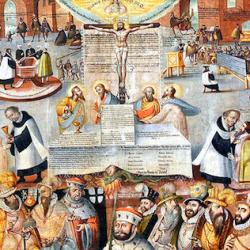One of the intriguing ideas in Deep Church Rising, written by Andrew G. Walker and Robin Parry, is that the church is currently suffering its “third schism.”
The first two are familiar: The schism of East and West during the eleventh century, and the Protestant-Catholic division of the sixteenth. Walker and Parry see a third schism coming in response to the challenge of the Enlightenment. On one side of the tear are churches that remained firmly orthodox; but many churches capitulated to “critical rationalism” and/or “Romanticism.”
Problem is, important as it is, the third schism hasn’t really penetrated the consciousness of orthodox Christians. We are still busy fighting the battles of the first two schisms, and are shocked to discover, suddenly, that the third schism has crept up and overtaken us.
Walker and Parry argue that the answer is “deep church,” a simultaneous burrowing into the Christian tradition and an openness to the new challenges and opportunities we face: Deep church is “about the marriage between the ‘new thing’ God is always doing in our lives, and the ‘old things’—the historic givens of the faith—that he has already done. . . . It is about anamnesia and acquiring the habit of forgetting old slights. It is about catholicity and a holy separation. It is about a recollected history and writing a new chapter in the annals of faith.”
The Enlightenment challenge is a given. We can’t go back to a pre-critical world, nor should we try: “going back has to be a post-critical retrieval in full awareness of what has transpired in between. And it cannot be with the aim of simply repeating the theology and practice of past Christianity.” In filling out this program, they insist on the necessity of right belief, analyze various contemporary departures from orthodoxy, make a case for the importance of liturgical formation.
I have differences with the authors on various details, but perhaps the biggest question has to do with the role of tradition. Speaking primarily to Evangelicals, Walker and Parry claim that “ecclesiology is the Achilles heel” of Evangelicalism, and, together with this, urge that “Scripture and tradition belong together like a team in a three-legged race.” They describe a relation of mutuality between the two: “Scripture in a sense is affirmed, sustained, and unfolded by tradition, but tradition is illuminated, judged, and controlled by Scripture.” They rightly point out that the mainstream reformers didn’t reject tradition per se.
While I have great sympathy with their encouragement to embrace the whole Christian tradition, their discussion left me dissatisfied. A fully Evangelical treatment of tradition has to make plenty of room for Jesus’ sharp assaults on the traditions of the elders. They say that “Holy Scripture is open to all sorts of different interpretations,” and that we need tradition to discover the truth. How tradition escapes the problem of multiple interpretations is unclear, especially now that we are living on the far side of the “third schism.” What now counts as genuine “tradition”? And how do we decide?
That doesn’t detract from the value or importance of this book. Walker and Parry lay out a compelling diagnosis of the church and a promising program for Evangelicalism’s future. I hope the book will be widely read.















